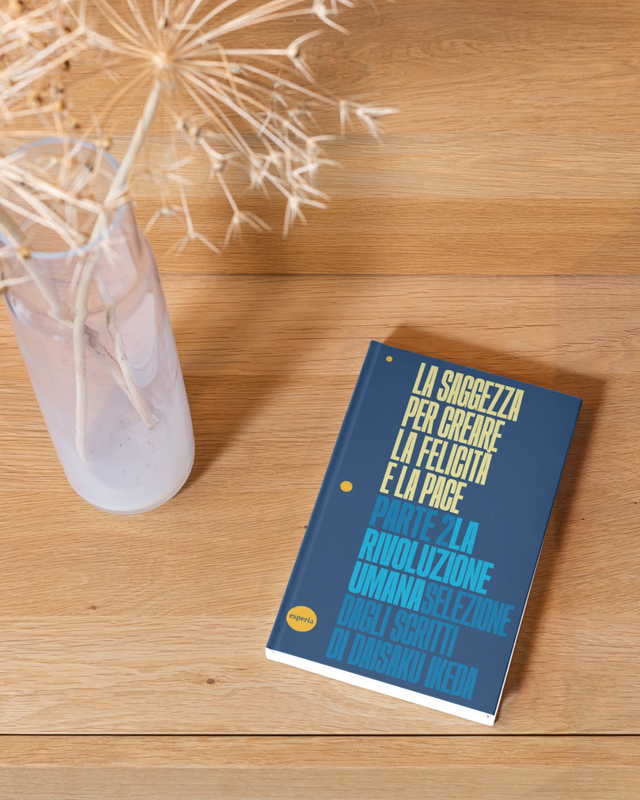
Libri e riviste
-

Esperia La forza del sorriso
Ritratto di Kaneko, moglie di Daisaku Ikeda. Per tanti anni Kaneko Ikeda, moglie e compagna inseparabile del presidente della Soka Gakkai, ha parlato quasi esclusivamente con il suo sorriso. Ora ha deciso di raccontare la sua “metà del cielo”, regalandoci una prospettiva diversa sulla missione condivisa con Daisaku Ikeda.Attraverso i ricordi di Kaneko, stimolati dalle domande di un’intervistatrice, i lettori hanno una rara opportunità di conoscere dall’interno alcuni protagonisti del movimento di kosen rufu: i ricordi di gioventù, le amicizie, la relazione tra maestro e discepolo, l’adolescenza e il matrimonio, la saggezza e il coraggio necessari per allevare i figli, per gestire la casa e superare le prove della vita, il contributo fondamentale delle donne alla società. Un incontro a tu per tu con la famiglia Ikeda, che consente di cogliere gli aspetti più semplici e quotidiani, ma anche le sfide e le vittorie di una famiglia che ha fatto propria la causa della felicità del genere umano.
€10,00
-

Esperia La nuova rivoluzione umana vol. 27
Il 1978, anno che fu designato come “Anno dello studio” e i cui eventi sono descritti nel presente volume, vede Shin'ichi Yamamoto impegnato in una serie di viaggi in varie prefetture e regioni del Giappone. Nell'incontrare i membri e i responsabili, Shin'ichi coglie ogni occasione per rivolgere loro calorosi incoraggiamenti e guide, nei quali profonde tutto il suo essere, senza risparmiarsi mai. Durante gli incontri, a volte anche informali, Shin'ichi ribadisce i princìpi fondamentali che sono alla base della Soka Gakkai, come per esempio l'importanza degli incoraggiamenti personali e il significato e la funzione delle riunioni di discussione. Si impegna anche a fare visita ai pionieri di quelle zone, le cui case per anni hanno svolto la funzione di base operativa delle attività locali, per ringraziarli personalmente.Il 9 aprile 1978, inoltre, viene inaugurata la scuola elementare Soka di Tokyo: Shin'ichi Yamamoto vede così realizzato l'obiettivo, tanto caro al suo maestro Toda e al primo presidente della Soka Gakkai Tsunesaburo Makiguchi, del completamento di un intero sistema scolastico Soka, dalla scuola materna alla specializzazione post-laurea, basato sugli ideali educativi di Makiguchi. Per Shin'ichi è anche la concretizzazione del suo impegno per far crescere individui capaci, basato sulla convinzione che i giovani siano i leader del futuro.
€20,00
-
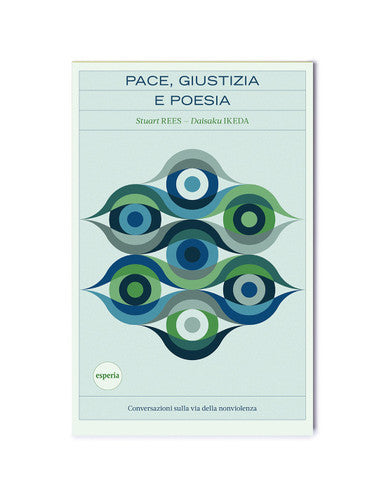
Esperia Pace, giustizia e poesia
La pace non è solo assenza di guerra. Spesso vengono lanciati appelli per gli ideali di “pace e giustizia” ma la maggior parte delle volte finiscono per diventare dei semplici slogan. Nel dialogo contenuto in questo libro, Stuart Rees e Daisaku Ikeda condividono le loro idee e visioni su come creare le condizioni per la pace attraverso una profonda presa di coscienza, un impegno per la nonviolenza in quanto “legge di vita” e una dedizione incrollabile. È convinzione degli autori che siano infatti questi elementi concreti, e non un’ideologia o un pensiero astratto, a rendere possibile una società che coltivi la dignità di tutte le persone. Infine, Rees e Ikeda sottolineano come lo “spirito poetico” sia uno strumento creativo d’eccellenza per immaginare e realizzare un futuro in cui pace e giustizia siano una cosa sola. Pace, giustizia e poesia offre un’analisi affascinante e convincente dei mali che affliggono la nostra società. Indica inoltre un percorso nonviolento che conduce a una pace autentica e offre a chi ricerca la pace l’incoraggiamento e l’ispirazione di cui ha bisogno. Joseph Camilleri, professore emerito di Relazioni Internazionali, La Trobe University, Melbourne
€15,90
-
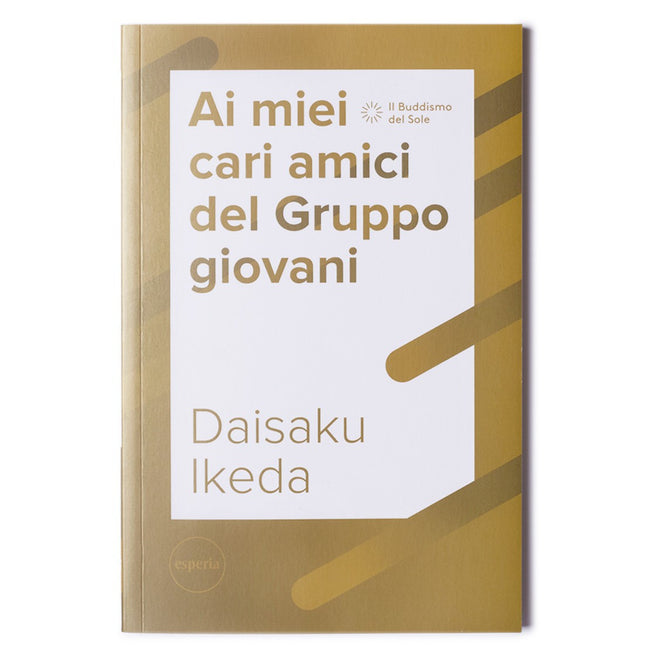
Esperia Ai miei cari amici del Gruppo giovani
Cinque lezioni di Daisaku Ikeda dalla serie "Il Buddismo del sole" dedicate ai membri del Gruppo giovani della Soka Gakkai. «Vorrei dedicare le prossime lezioni ai membri del Gruppo giovani, ai quali affido completamente il movimento di kosen rufu mondiale. Desidero condividere con loro vari passi del Daishonin tratti dai suoi scritti che offrono indicazioni per diventare responsabili ricchi di umanità e per vivere una gioventù vittoriosa.» Con queste parole Daisaku Ikeda introduce le cinque lezioni presenti in questo volume che, sebbene rivolte in particolare modo ai giovani, offrono un’importante guida per tutti i membri della Soka Gakkai. Avere coraggio, manifestare uno spirito invincibile, far crescere i successori, adottare una filosofia umanistica, realizzare kosen rufu: Ikeda approfondisce questi argomenti partendo dalle parole di Nichiren Daishonin, senza mancare mai di condividere la propria esperienza personale di lotta condivisa con il suo maestro Josei Toda.
€6,00
-

Esperia La nuova rivoluzione umana voll. 25/26
Il romanzo autobiografico di Daisaku Ikeda, presidente della SGI. A partire dai primi mesi del 1977 Shin’ichi Yamamoto compie una serie di viaggi in varie prefetture del Giappone: in ogni luogo l’incontro con i responsabili locali diviene l'occasione per offrire guide e consigli su vari aspetti dell'attività come l’unità e l’atteggiamento dei leader, ma anche indicazioni pratiche su argomenti quali, per esempio, il modo di organizzare le riunioni, come fare il moderatore durante gli incontri o come trasmettere le comunicazioni. Nel settembre dello stesso anno, nel villaggio di Atsuta, il paese di origine di Josei Toda, viene inaugurato il Parco cimiteriale a lui dedicato, primo esempio di cimitero realizzato dalla Soka Gakkai. Il presidente Yamamoto partecipa all’inaugurazione e espone la profonda visione della vita e della morte del Buddismo di Nichiren Daishonin. Il 1978, "Anno dello studio", è caratterizzato da un cambiamento nella struttura organizzativa della Soka Gakkai: dal sistema "verticale", in cui ogni membro apparteneva alla zona di cui faceva parte la persona che lo aveva introdotto al Buddismo, alla nuova struttura incentrata sui capitoli e basata su area geografica, con l'intento di permettere alle persone di mettere radici nella realtà locale e di impegnarsi nel dialogo buddista con le persone della propria comunità. Inoltre, quell'anno Shin'ichi si impegna ad aprire la strada allo studio del Buddismo come forza motrice per kosen rufu, dando un forte impulso alle attività di studio della Gakkai.
€20,00
-

Esperia Io sono Shinichi Yamamoto
Uno splendido calendario da tavolo illustrato con passi scelti dalla Nuova rivoluzione umana. Prodotto da tavolo contenente cinquantadue passi, uno per ogni settimana dell’anno, accompagnati da splendide illustrazioni di Giuliana Gusmini. La selezione abbraccia l’intera opera e offre ai membri una piacevole occasione per scoprire gli incoraggiamenti presenti nella Nuova rivoluzione umana, fornendo uno spunto per l’approfondimento del romanzo.
€8,50
-
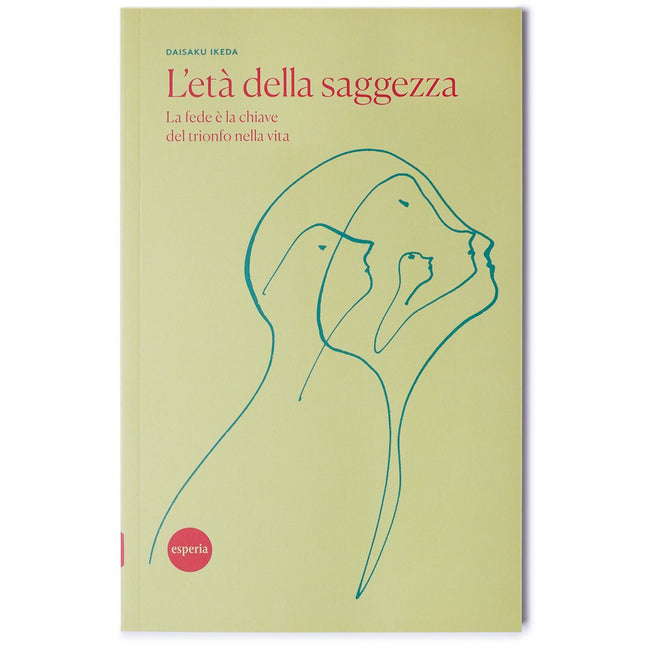
Esperia L'età della saggezza
La fede è la chiave del trionfo nella vita. Per secoli il termine anziano è stato sinonimo di persona ricca di esperienza, depositaria di un patrimonio insostituibile di conoscenza e saggezza. In tempi più recenti i mutamenti che hanno trasformato le nostre società ci hanno abituato a un'immagine diversa: debole, bisognosa di cure, scarsamente utile, la persona avanti negli anni viene percepita essenzialmente come problema sociale. Nel volume si delinea un affascinante percorso per restituire all'individuo il diritto e la capacità di vivere una vita piena e appagata fino all'ultimo, decisivo istante.
€9,50
-
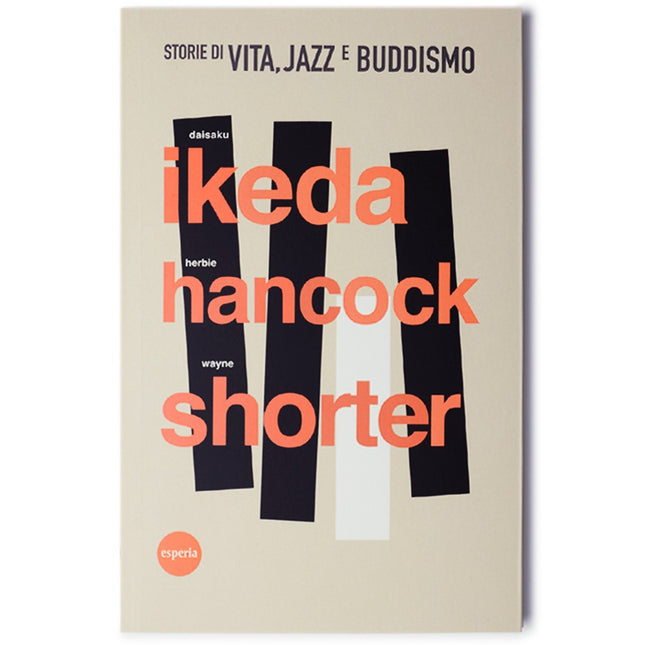
Esperia Storie di vita, jazz e buddismo
Il maestro spirituale si confronta con due discepoli che hanno raggiunto i vertici della notorietà nell’ambito del Jazz contemporaneo. Il desiderio di trasmettere lo spirito creativo e l’importanza della crescita interiore dell’artista, così come di ogni altra persona, sono alcuni dei temi intorno a cui si articola il dialogo. I tre autori descrivono diverse esperienze rilevanti della loro vita e ci aiutano a capire quanto sia importante il continuo processo di rinnovamento che accomuna la ricerca religiosa e la creatività di un artista.
€14,00
-
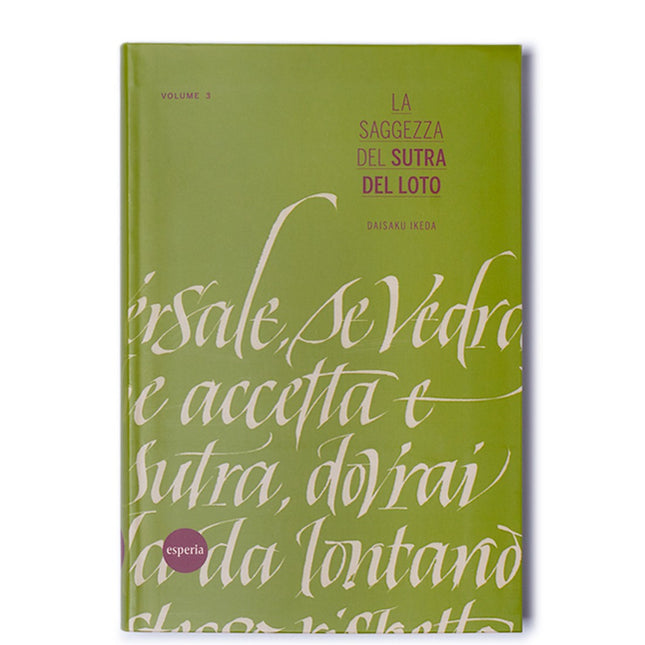
Esperia La saggezza del Sutra del Loto volume 3
Il terzo e ultimo volume della Saggezza del Sutra del Loto affronta i capitoli che vanno dal diciassettesimo al ventottesimo. Particolare risalto assumono la figura del Bodhisattva Mai Sprezzante, che rappresenta il modello ideale del discepolo del Budda dedito a diffonderne la parola, e la cerimonia di affidamento, con la quale il Budda conferisce a tutti i discepoli la missione di propagare il suo insegnamento nelle epoche future. Grande attenzione viene dedicata al capitolo ventunesimo, Poteri sovrannaturali del Tathagata, da cui emergono una volta di più gli elementi che caratterizzano in modo univoco il Sutra del Loto: l’assoluta uguaglianza degli esseri viventi e del Budda e il fatto che la condizione vitale illuminata esiste nella vita di ogni persona.
€15,90
-
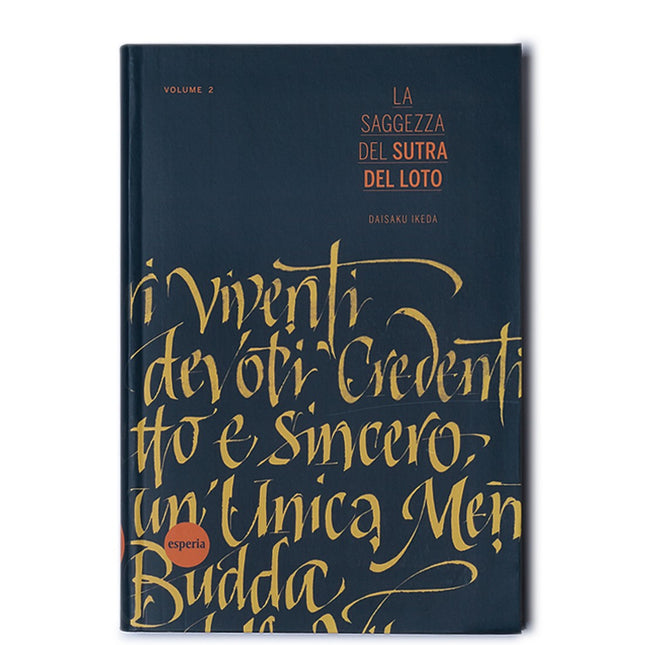
Esperia La saggezza del Sutra del Loto volume 2
Il secondo volume dedicato al commento del Sutra del Loto affronta i temi presenti nei capitoli che vanno dal dodicesimo al sedicesimo. Tra questi la predizione dell’illuminazione per gli esseri malvagie per le donne, mai considerata possibile nei sutra precedenti. Inoltre si esamina in modo molto approfondito il capitolo Durata della vita del Tathagata, che rivela il concetto di eternità della vita e rappresenta il cuore dell’intero sutra. Un’occasione per accostarsi ad argomenti di grande portata filosofica accompagnati dalla profonda intuizione e dalle interpretazioni estremamente attuali di Daisaku Ikeda.
€15,90
-

Esperia Sfide e Visioni per il Futuro
Nel settimo volume dei Protagonisti del XXI secolo, il dialogo tra i giovani e il presidente Ikeda tocca temi etici quali il bene e la giustizia, la lotta contro la natura demoniaca dell'autorità, la vera libertà, e temi esistenziali come la vita e la morte. Esortando a non lasciare il duro lavoro o la responsabilità agli altri, Ikeda indica l'importanza di scoprire la missione individuale che solo noi possiamo compiere.
€6,00
-

Esperia Giovani Cittadini del Mondo
Ikeda dialoga con i giovani sul tema della cittadinanza globale. Cosa significa per un giovane diventare felice? Questo ideale può essere realizzato solo cercando la soddisfazione nel lavoro e nella rete di amicizie e legami personali? Nel volume vengono affrontati argomenti di portata globale, che pur sembrando lontani dalla realtà quotidiana hanno ripercussioni su chi vive la propria giovinezza in un mondo sempre più complicato. Daisaku Ikeda approfondisce il tema dei diritti umani e spiega cosa significhi per lui essere cittadini del mondo. Sottolinea l’importanza di coltivare dei nobili ideali e di essere partecipi della società in cui si vive. Il volume include un dialogo inedito in Italia, sul tema del volontariato.
€6,00
Hai visto 72 prodotti su 132













